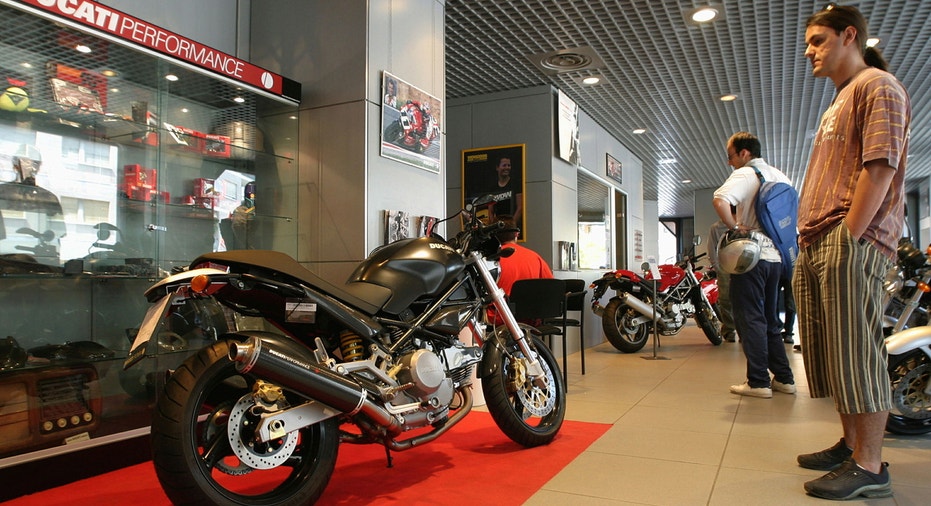Harley-Davidson discussing purchase of Italian rival Ducati from VW

BERLIN -- Harley-Davidson Inc. is in talks to buy Ducati Motor Holding SpA from Germany's Volkswagen AG in a deal that could bring together two of the most storied motorcycle names and pave the way for further divestments by the German car maker.
The talks are still in very early stages and aren't exclusive, three people familiar with the situation said. Audi, the luxury Volkswagen brand that owns Ducati, commissioned investment bank Evercore to begin floating a potential sale of the boutique motorcycle maker to investors in March, according to the people, and is seeking up to EUR1.5 billion ($1.68 billion).
Harley-Davidson, an iconic symbol of U.S. postwar culture, appears to be seriously considering a bid, these sources said. They said the company had engaged Goldman Sachs and visited Ducati's plant and management in Bologna, Italy in early May.
A Harley-Davidson spokeswoman said the company never comments on market speculation.
Volkswagen declined to comment. Goldman Sachs didn't immediately respond to requests for comment.
One of the most technically advanced motorcycle makers in the industry, Ducati is renowned for its prizewinning high-performance racing motorbikes. Harley-Davidson, whose bikes are known as "hogs", faces an aging baby-boomer customer base and is eager to expand its business.
Ducati sold 55,451 motorcycles in 2016, an increase of 1.2% from the previous year. Audi doesn't publish Ducati sales or earnings.
The Italian brand is a small part of the Volkswagen empire, but analysts say a sale could generate momentum for further streamlining, including the much-awaited public offering of the company's truck business that includes the MAN and Scania brands.
Arndt Ellinghorst, an analyst at Evercore ISI, a London-based brokerage, said "a deal would serve to increase our conviction that VW will carve out its trucks business, a much larger piece of the pie."
Andreas Renschler, head of the truck business, has said repeatedly that spinning off the business was an option, but that no decision had been made.
At the height of the diesel emissions-cheating scandal, when Volkswagen was still unsure of the ultimate costs of resolving the affair, Ducati was one of a number of assets it marked for disposal should it need to raise cash, according to a person familiar with the situation.
Since then, Volkswagen Chief Executive Matthias Müller has begun slashing costs and streamlining the company. He bundled some activities, such as the components business, fueling speculation that Volkswagen could spin off the business.
Mr. Müller had his executives pull together what company insiders call the "Best Owner List" -- assets that might best be owned by someone else -- a person familiar with the situation said.
In the early part of its 80-year history, Volkswagen was a one-product auto maker, churning out Beetles in Wolfsburg for export around the world. It has since amassed a varied stable in all market segments, including Audi, Spanish car maker Seat and Czech auto group Skoda.
As CEO and later as chairman, Ferdinand Piech, scion of Beetle designer Ferdinand Porsche, took the Volkswagen brand upmarket as he had done previously with Audi, turning it into a competitor to BMW and Mercedes-Benz. He scooped up three prestigious nameplates -- Bentley, Lamborghini and Bugatti -- in 1998 and acquired Ducati through Audi in 2012 from Industrialinvest, a private equity group, for about $1.2 billion.
After Mr. Piech left the company this year and announced the sale of his shares in the family holding that controls the majority of Volkswagen's voting capital, analysts expected Volkswagen to begin peeling off some of the prestigious assets acquired under his tenure.
But the diesel crisis has turned out to be more manageable than expected for the company, which sold 10.4 million vehicles last year, generated EUR217 billion in revenue, and sits on a cash pile of more than EUR20 billion.
So far, Volkswagen has agreed to pay nearly $25 billion in fines, penalties and compensation to consumers. But it continues to generate large amounts of cash from its auto businesses, which people inside the company say has relieved pressure to dispose of assets quickly.
A sale of Ducati isn't certain and could face opposition from labor, according to two of the people familiar with the situation.
"Ducati is a jewel and its sale isn't supported by the labor representatives on the supervisory board," a spokesman for Volkswagen's works council, the in-house labor representative, said. "Technically, Harley-Davidson is miles behind Ducati. So, this can't be serious."
Andrew Tangel in Chicago contributed to this article
Write to William Boston at william.boston@wsj.com
(END) Dow Jones Newswires



















